My sister (a writer who copyedits for a living) just sent me this review of several new books on the business of making art and I wanted to share it. I’m currently painting like crazy and posting on Etsy. Her idea too. I’ve finished some smaller works that I began a couple of years ago during a trip to Galiano Island off the coast of Vancouver. And I’m finalizing some nudes that I worked on during classes at UC Berkeley in the late 90’s. I never painted over them and now I’m glad I didn’t.
I found at least one painter on Etsy (actually quite good) who has sold 300 of his smaller pieces in 2 years and gave me some tips. The idea that I could make a living from my  painting remains the holy grail. It sure as hell beats doing anything else.
One book that Ms. Bachner is slamming in the review cited above is ‘My So-Called Freelance Life’ by Michelle Goodman. Goodman claims that the artist/writer/whatever can be content in setting aside a few hours a week to the muse and this will suffice. As someone who tried that for the last 18 years, I can confirm that it doesn’t. I would spend hours  at my other ‘jobs’ in late afternoons or mid mornings, daydreaming about painting – my real job and passion. I would lapse during meetings to remember the light of an afternoon or dusk and long to rush home to capture the memory on canvas. I spent vacations traipsing off to rugged mountains and coasts to paint. Acting the tourist or going somewhere to discover the joys of the culture, or to relax, didn’t interest me. I simply wanted to paint during every waking hour. Â
And now, with practically unlimited time to myself and my passion, I can confirm that I’d rather sell all my paintings for under $50 each than to return to that other world and pretend that the ineffable need to create isn’t paramount. Maybe even less if it comes to that. The beauty – and curse- of having a talent is that it’s just about all you can offer. There is no choice and when it comes to sacrifice, nothing seems holy enough to counter that all consuming need. Â
As for the title of Genius, I doubt that Van Gogh would’ve claimed it for himself. It isn’t really about the end result, which only history will determine anyway, but more about the drive to pursue a voice. Having that voice matter to one’s self is the key to longevity, along with the ability to pursue a goal without a known endgame.Â
Her review, in excerpts here:
Genius and Heroin does what books like the recent anthology Live Through This: On Creativity and Self-Destruction utterly fail to do: it subtly but irrevocably shows how the life of a gifted person (meaning someone who, as Czeslaw Milosz put it, has a calling as a “secretary to the invisibleâ€) differs from the life of a, well, non-gifted person. It’s social suicide these days to admit that art isn’t “work†for you, that it’s something that happens to you as if you’re possessed, that to not create it would be like seeing a human baby bleeding and abandoned on a street corner and leaving him there to die, that you are dazzled by the electric words that come to you from some angel or demon or forgotten, ancient god. But the fact is that the creative part is erotic, and mystical, and rapturous, and deadly, and filthy, and horrible, and ecstatic. It can be agony, it can break you, but it’s not work. It’s the life part — the scrimmages with bureaucrats, the effects of late-stage capitalism, the housecleaning, the diseases, the copywriting — that’s work.
“Making time for the work you really want to do is about making choices and compromises when you have to,†Goodman concludes, “Some freelancers budget an afternoon or day each week for tapping their creative vein… Others flit from three-month bread-and-butter gig to three-month creative stint and back again. And some get the bulk of their annual creative work done during a few weeks a year spent at an artist’s retreat.â€
Certain art forms can thrive with this sort of compromise — filmmaking, for example, or ensemble theatre, can be done three-months-on, three-months-off — but all Goodman’s solutions are a killer for painting or poetry, which is why taking to the streets or working as a plongeur can seem more doable than writing the kind of fiction that you know will get you a particular fellowship, or working on a commissioned piece that matches the living-room set of a corporate wife.Â
Trying to regiment great art as if you’re throwing a neighborhood casserole party or writing a corporate report results in insidiously uninspired work. It’s not that you can’t be disciplined, but creating real work is different from the meaningless products of mundane society. The process is different. The dazzling, thrilling results are still different, even all of these years after a bunch of sour academics, unhappy geniuses and talented but hyperbolic writers have proclaimed the death of art.
If your genius is acting up, and you suppress it by treating it like a hobby, beware. You would (hopefully) not mistake a loosed, rampaging wildcat for a caged hamster. If you make a similar error of judgment with your genius, you risk the same thing: literal death. And if you win, and murder your genius, and do piddling, mediocre work that fits easily into your Sunday afternoon schedule, then you doom the rest of us (metaphorically or maybe not) to a world without the beauty of big predators, without the variety that frightening and exotic animals bring, without menace, awe or surprise.
Genius: no matter what your life situation, your real work is happening to you anyway, and you can’t stop it. If you try to stop it, or you get a block, you go crazy and want to die. Hobbyist: you feel like if you started writing, or started painting, you would be more fulfilled. Genius: You already do your real work, period. You have no choice. Hobbyist: You’d like to learn how to be a great writer or artist by studying with someone you admire. Genius: Your work does battle with you, insisting that it’s good or right when you wanted it to be about something else entirely, or letting you know it’s inauthentic even when you’ve carefully constructed it. Hobbyist: you want to learn to tap into your inspiration. Genius: the demon inside you is like a tapeworm.
——-
A friend, an inspired filmmaker, agreed to recommend me for a large and prestigious grant. He suggested that I write something to the effect of ‘I’m on fire, give me the money!’Â
Â
This is from a life class at UCBerkeley, Â in ’98. I was taking so many classes when I lived and worked in San Francisco that I might as well have been enrolled. This reminds me a little of David Park, whose work I admire. Check out the link, you can see his daughters and others discussing his methods. I added the background recently, based on the light I remember from trips to Mendocino.
Â
This series of small oils (9″x12″) originally sketched out in acrylic, began in 2006 on a trip to Galiano, in the Gulf Islands off the coast of Vancouver Island. I stayed in a house on the cliffs and could paint from my deck and kitchen table. The sea and light were sublime.
Â
and this is my latest from early winter;

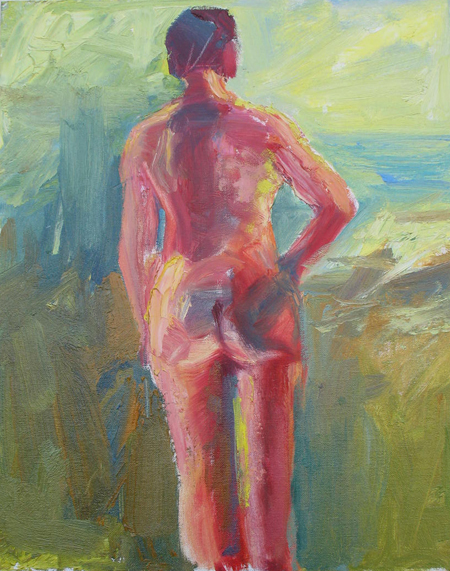
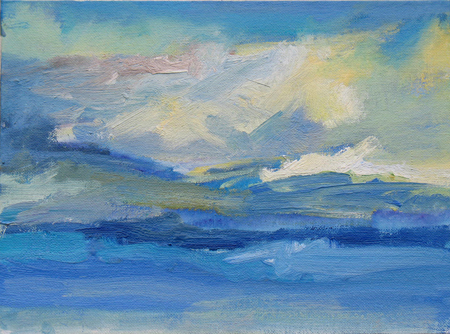
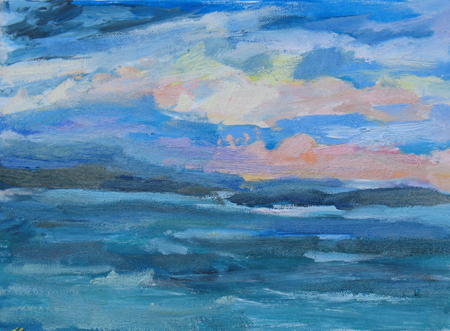
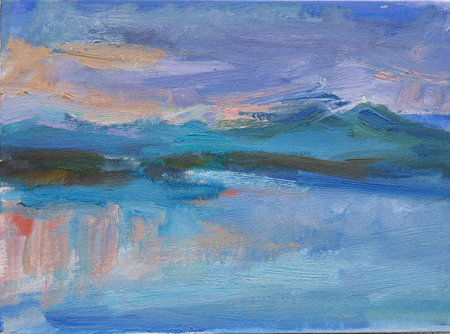
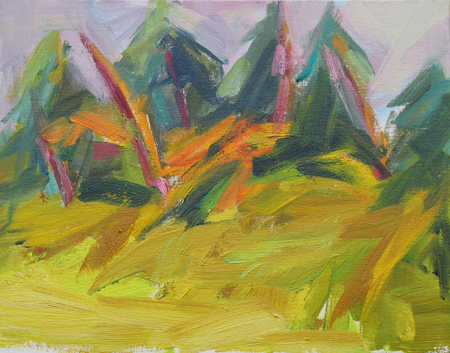
I’ve looked at all your work that you’ve posted on your website and I’m highly impressed. I hope I can have as much confidence with my brush strokes one day. And you apparently travel… a lot! You’ve inspired me to paint in big ways.
I love, love, love your abstracts and your landscapes. They’re refreshing. You remind me vaguely of a New York artist that I happened upon a year or so ago… Leah Durner is her name. Though I prefer your work. I look forward to seeing more of your art in the future.
Have you thought of doing some smaller works on paper? You probably already do that in the form of studies, but I think you might be surprised that people would really like to buy them! 😉
Great stuff, Victoria.
Gawsh…. thanks Chad. I appreciate the appreciation.
Yes, small works on paper- exactly what I’ve been doing lately. But I still like the drag of brush over canvas tooth.
One of my major influences is Joan Mitchell.